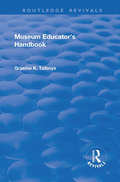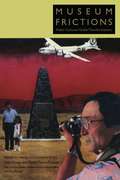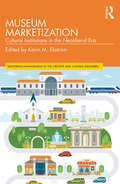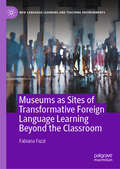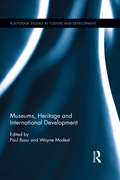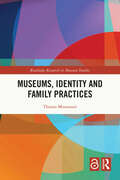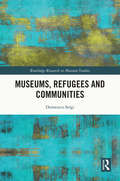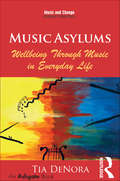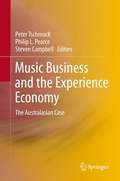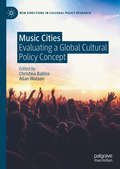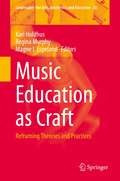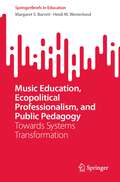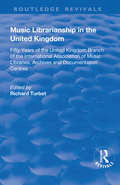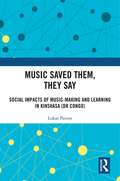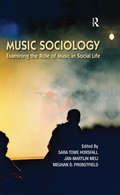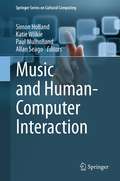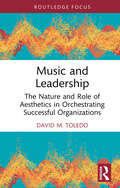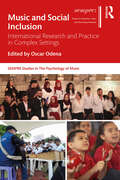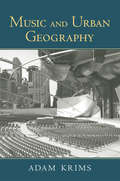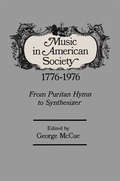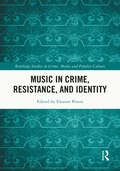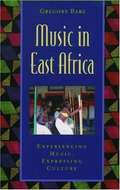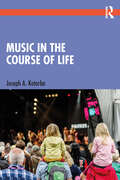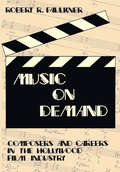- Table View
- List View
Museum Educator's Handbook (Routledge Revivals)
by Graeme K TalboysThis title was first published in 2000. A comprehensive and holistic guide to resourcing and running a museum education service. The author suggests how to set up a service and takes the reader through bureaucratic and logistical problems that may be encountered. The second section sets out the likely needs of various groups.
Museum Frictions: Public Cultures/Global Transformations
by Ivan Karp Corinne A. Kratz Lynn Szwaja Tomás Ybarra-FraustoMuseum Frictions is the third volume in a bestselling series on culture, society, and museums. The first two volumes in the series, Exhibiting Cultures and Museums and Communities, have become defining books for those interested in the politics of museum display and heritage sites. Another classic in the making, Museum Frictions is a lavishly illustrated examination of the significant and varied effects of the increasingly globalized world on contemporary museum, heritage, and exhibition practice. The contributors--scholars, artists, and curators--present case studies drawn from Africa, Australia, North and South America, Europe, and Asia. Together they offer a multifaceted analysis of the complex roles that national and community museums, museums of art and history, monuments, heritage sites, and theme parks play in creating public cultures. Whether contrasting the transformation of Africa's oldest museum, the South Africa Museum, with one of its newest, the Lwandle Migrant Labor Museum; offering an interpretation of the audio guide at the Guggenheim Bilbao; reflecting on the relative paucity of art museums in Peru and Cambodia; considering representations of slavery in the United States and Ghana; or meditating on the ramifications of an exhibition of Australian aboriginal art at the Asia Society in New York City, the contributors highlight the frictions, contradictions, and collaborations emerging in museums and heritage sites around the world. The volume opens with an extensive introductory essay by Ivan Karp and Corinne A. Kratz, leading scholars in museum and heritage studies. Contributors. Tony Bennett, David Bunn, Gustavo Buntinx, Cuauhtmoc Camarena, Andrea Fraser, Martin Hall, Ivan Karp, Barbara Kirshenblatt-Gimblett, Corinne A. Kratz, Christine Mullen Kreamer, Joseph Masco, Teresa Morales, Howard Morphy, Ingrid Muan, Fred Myers, Ciraj Rassool, Vicente Razo, Fath Davis Ruffins, Lynn Szwaja, Krista A. Thompson, Leslie Witz, Toms Ybarra-Frausto
Museum Marketization: Cultural Institutions in the Neoliberal Era (Mastering Management in the Creative and Cultural Industries)
by Karin M. EkströmThis wide-ranging book explores the impact of marketization on the creative industries. With critical perspectives from a variety of disciplines and global experts, numerous examples from international cultural institutions are employed to illuminate the topic. Culture and business have become increasingly intertwined, and cultural institutions need to be aware of their place in the market. Commercial awareness, which was previously disparaged, is now seen as a legitimate and necessary response to increased competition, enhancing experience, increasing accessibility, broadening inclusivity and sustainable futures with diminishing funding. The contributions to this book highlight that marketing, public relations, sponsorship and fundraising have become integral to the survival of many museums, galleries and events. Of interest to students and scholars across topics such as arts marketing, arts administration, heritage marketing and museum studies, the book is also insightful for reflective practitioners in the creative sector.
Museums as Sites of Transformative Foreign Language Learning Beyond the Classroom (New Language Learning and Teaching Environments)
by Fabiana FazziThis book takes a look at the affordances of engaging second/foreign language students in educational projects that bridge the gap between the classroom and the museum. Studies on language learning and teaching beyond the classroom have shown that students learn in different settings and through different types of activities and that their learning is influenced by the intersection of different dimensions. Drawing on both language and museum learning and teaching research, this book discusses the aspects that make the museum an ideal language learning setting and then outlines evidence-based pedagogical guidelines to design effective learning experiences for language learners across the classroom and the museum. It will be of interest to graduate students, language teachers, teacher trainers, museum educators, and researchers in fields including Educational Linguistics, Anthropological Linguistics, and Museum Studies (Education).
Museums, Heritage and International Development (Routledge Studies in Culture and Development #1)
by Wayne Modest Paul BasuWhile many claims are made regarding the power of cultural heritage as a driver and enabler of sustainable development, the relationship between museums, heritage and development has received little academic scrutiny. This book stages a critical conversation between the interdisciplinary fields of museum studies, heritage studies and development studies to explore this under-researched sphere of development intervention. In an agenda-setting introduction, the editors explore the seemingly oppositional temporalities and values represented by these "past-making" and "future-making" projects, arguing that these provide a framework for mutual critique. Contributors to the volume bring insights from a wide range of academic and practitioner perspectives on a series of international case studies, which each raise challenging questions that reach beyond merely cultural concerns and fully engage with both the legacies of colonial power inequalities and the shifting geopolitical dynamics of contemporary international relations. Cultural heritage embodies different values and can be instrumentalized to serve different economic, social and political objectives within development contexts, but the past is also intrinsic to the present and is foundational to people’s aspirations for the future. Museums, Heritage and International Development explores the problematics as well as potentials, the politics as well as possibilities, in this fascinating nexus.
Museums, Identity and Family Practices (Routledge Research in Museum Studies)
by Theano MoussouriMuseums, Identity and Family Practices locates museum participation and meaning making in the realm of everyday family practices, which are central to understanding the role museums play in family social life.Drawing on a substantial amount of data from a wide range of sources, Moussouri discusses the importance of understanding how family practices are enacted across settings and how the arena of the museum can facilitate certain family practices and impede others. Developing and theorising key concepts, the book elucidates the key research themes, including everyday family practice; meaning making; and the structural characteristics of museums as arenas for the family visit activity. The analysis is rooted in a dialectical theoretical framework specifically developed to bridge the macrolevel (social order or the arena of the museum) and microlevel (family practices).Museums, Identity and Family Practices offers a novel and holistic approach to studying contemporary families and, as such, is key reading for scholars and students of museum and heritage studies, family studies, visitor studies, cultural studies, education, sociology and anthropology. Museum and heritage professionals working with families in different communities around the world will also find this book relevant to their practice.The Open Access version of this book, available at http://www.taylorfrancis.com, has been made available under a Creative Commons Attribution-Non Commercial-No Derivatives (CC-BY-NC-ND) 4.0 license.
Museums, Refugees and Communities (Routledge Research in Museum Studies)
by Domenico SergiMuseums, Refugees and Communities explores the ways in which museums in Germany, The Netherlands and the UK have responded to the complexities and ethical dilemmas involved in discussing the reasons for, and issues surrounding, contemporary refugee displacements. Building upon an ethnographic study carried out in the UK with refugees from the Democratic Republic of Congo, the book explores how object-led approaches can inspire new ways of thinking about and analysing refugees’ experiences and European museums’ work with their communities. Enlarging the developing body of research on museums’ increasing engagement with human rights and focusing in particular on the social, cultural and practical dimensions of community engagement practices with refugees, the book also aims to inform growing debates on museums as sites of activism. Museums, Refugees and Communities offers an innovative and interdisciplinary examination of museum work with and about refugees. As such, it should appeal to researchers, academics and students engaged in the study of museums, heritage, migration, ethics, community engagement, culture, sociology and anthropology.
Music Asylums: Wellbeing Through Music In Everyday Life (Music and Change: Ecological Perspectives)
by Tia DeNoraTaking a cue from Erving Goffman’s classic work, Asylums, Tia DeNora develops a novel interdisciplinary framework for music, health and wellbeing. Considering health and illness both in medical contexts and in the often-overlooked realm of everyday life, DeNora argues that these identities are by no means mutually exclusive. Moreover, she suggests that the promotion of health and more specifically, mental health, involves a great deal more than a concern with medication, genetic predispositions, clinical and neuro-scientific procedures. Adopting a holistic, interactionist focus, Music Asylums reconnects states of wellness and wellbeing to encounters with others and - critically - to opportunities for aesthetic experience. Building on DeNora's earlier work on music as a technology of self in everyday life, the book presents music as an active ingredient of action, identity, capacity and consciousness. From there, it suggests that access to, and evaluation of, music is an important ethical matter. Intended for scholars and practitioners in psychiatry and psychology, palliative care, socio-music studies, music psychology and the allied health professions, Music Asylums showcases music's role in the existential project of being and staying well, mentally and physically, from moment-to-moment and across all realms of social life.
Music Business and the Experience Economy
by Philip L. Pearce Peter Tschmuck Steven CampbellMusic Business and the Experience Economy is the first book on the music business in Australasia from an academic perspective. In a cross-disciplinary approach, the contributions deal with a wide-range of topics concerning the production, distribution and consumption of music in the digital age. The interrelationship of legal, aesthetic and economic aspects in the production of music in Australasia is also highlighted as well as the emergence of new business models, the role of P2P file sharing, and the live music sector. In addition, the impact of the digital revolution on music experience and valuation, the role of music for tourism and for branding, and last but not least the developments of higher music education, are discussed from different perspectives.
Music Cities: Evaluating a Global Cultural Policy Concept (New Directions in Cultural Policy Research)
by Allan Watson Christina BallicoThis book provides a critical academic evaluation of the ‘music city’ as a form of urban cultural policy that has been keenly adopted in policy circles across the globe, but which as yet has only been subject to limited empirical and conceptual interrogation. With a particular focus on heritage, planning, tourism and regulatory measures, this book explores how local geographical, social and economic contexts and particularities shape the nature of music city policies (or lack thereof) in particular cities. The book broadens academic interrogation of music cities to include cities as diverse as San Francisco, Liverpool, Chennai, Havana, San Juan, Birmingham and Southampton. Contributors include both academic and professional practitioners and, consequently, this book represents one of the most diverse attempts yet to critically engage with music cities as a global cultural policy concept.
Music Education as Craft: Reframing Theories and Practices (Landscapes: the Arts, Aesthetics, and Education #30)
by Regina Murphy Kari Holdhus Magne I. EspelandThis book is a collection of leading international authors in the field of music education taking the concept of 'craft' as a starting point to deconstruct and reconstruct their understanding of the practices and theories of music education. Their insights draw from deep wells of resources located in historical, philosophical, epistemological, musicological and educational traditions that lead to rich and complex insights on the evolving field of music education. In so doing, they generate a constellation of new understandings and illustrations of what crafts can mean in this field. Historically, the idea of craft was typically associated with a skill or experience in knowing how to do or make something, or an activity of some kind that requires specific professional skills. In Old Norse, the concept for craft was kraptr, meaning strength and virtue, while Old English and continental use was associated with power and physical strength, as well as skill. When these definitions of ‘crafts’ are infused into contemporary understandings of the field of music education as a professional field, a whole new set of possible interpretations are unearthed. Such insights are not exhaustive, but rather, point the way in which this professional, diverse, inclusive and ambiguous field might continue to evolve in the 21st century.
Music Education, Ecopolitical Professionalism, and Public Pedagogy: Towards Systems Transformation (SpringerBriefs in Education)
by Margaret S. Barrett Heidi M. WesterlundThis book challenges the dominant expertise professionalism rationale for music education by responding to the call to develop ‘ecological awareness’ at a time when all professions have a moral obligation to place sustainable and interdependent life at the center. The book aims to expand music education’s professional horizons to acknowledge the responsibility of the music field to contribute to the demands of complex questions of sustainability and identify the ways in which sustainable music education may be strengthened through an activist relational ecological stance. It suggests a radical moral turn by asking: What if music education is recognised as part of the problem of sustaining unsustainability? and What if music teacher education was developed in and through dialogue with a futures perspective? These questions are interrogated through a critical analysis of the historical positioning of music in education and an interdisciplinary application of theories of ecology and professionalism.
Music Librarianship in the UK: Fifty Years of the British Branch of the International Association of Music Librarians (Routledge Revivals Ser.)
by Richard TurbetThis title was first published in 2003. The UK branch of the International Association of Music Libraries was founded in 1953. This volume of specially commissioned essays celebrates the golden jubilee of branch's foundation and surveys the achievements of the last 50 years. With an emphasis on practical music librarianship, the essays examine the challenges that have faced the profession in recent years, as well as current developments in the field and the impact of modern advances in information technology.
Music Saved Them, They Say: Social Impacts of Music-Making and Learning in Kinshasa (DR Congo)
by Lukas PaironMusic Saved Them, They Say: Social Impacts of Music-Making and Learning in Kinshasa (DR Congo) explores the role music-making has played in community projects run for young people in the poverty-stricken and often violent surroundings of Kinshasa, the capital city of the Democratic Republic of the Congo. The musicians described here – former gang members and so-called "witch children" living on the streets – believe music was vital in (re)constructing their lives. Based on fieldwork carried out over the course of three-and-a-half years of research, the study synthesizes interviews, focus group sessions, and participant observation to contextualize this complicated cultural and social environment. Inspired by those who have been "saved by music", Music Saved Them, They Say seeks to understand how structured musical practice and education can influence the lives of young people in such difficult living conditions, in Kinshasa and beyond. "... a tribute to the persistence, engagement and courage of the people in these projects, who can be proud that their work is now exposed to a global audience, not just of researchers but also to practitioners around the world who could learn from and be inspired by these hitherto unknown projects." —John Sloboda, Research Professor, Guildhall School of Music & Drama
Music Sociology
by Sara Towe Horsfall Jan-Martijn Meij Meghan ProbstfieldMusic Sociology explores 16 different genres to demonstrate that music everywhere reflects social values, organisational processes, meanings and individual identity. Presenting original ethnographic research, the contributors use descriptions of subcultures to explain the concepts of music sociology, including the rituals that link people to music, the past and each other. Music Sociology introduces the sociology of music to those who may not be familiar with it and provides a basic historical perspective on popular music in America and beyond.
Music and Human-Computer Interaction
by Simon Holland Katie Wilkie Allan Seago Paul MulhollandThis agenda-setting book presents state of the art research in Music and Human-Computer Interaction (also known as 'Music Interaction'). Music Interaction research is at an exciting and formative stage. Topics discussed include interactive music systems, digital and virtual musical instruments, theories, methodologies and technologies for Music Interaction. Musical activities covered include composition, performance, improvisation, analysis, live coding, and collaborative music making. Innovative approaches to existing musical activities are explored, as well as tools that make new kinds of musical activity possible. Music and Human-Computer Interaction is stimulating reading for professionals and enthusiasts alike: researchers, musicians, interactive music system designers, music software developers, educators, and those seeking deeper involvement in music interaction. It presents the very latest research, discusses fundamental ideas, and identifies key issues and directions for future work.
Music and Leadership: The Nature and Role of Aesthetics in Orchestrating Successful Organizations (Leadership Horizons)
by David M. ToledoMusic and Leadership: The Nature and Role of Aesthetics in Orchestrating Successful Organizations explores how music can offer fresh insight into the practice of leadership. Moving beyond traditional models focused solely on strategy and systems, the book argues that leadership is also a performative and aesthetic act. It requires timing, emotional awareness, and the ability to shape meaning. Drawing on influential works of Western classical music by Bach, Beethoven, and Stravinsky, this book demonstrates how great composers model distinct leadership approaches in moments of cultural change. The book pairs these musical case studies with well-known modern leaders such as Steve Jobs, Leonard Bernstein, and Condoleezza Rice, who illustrate how aesthetic habits can shape public influence and organizational success.At the heart of the book is the Orchestrating Success Framework, which translates core musical concepts such as motif, harmony, rhythm, and silence into practical leadership tools. Accessible to readers in business, education, and the arts, this book bridges the humanities and leadership studies in a compelling and original way. With its interdisciplinary approach and clear applications, Music and Leadership is both a challenge and an invitation to lead not just with plans and metrics but also with artistry, presence, and imagination.
Music and Social Inclusion: International Research and Practice in Complex Settings (SEMPRE Studies in The Psychology of Music)
by Oscar OdenaHow do we develop social inclusion through musical activities? What is the power of music in enhancing individual inclusion, group cohesion, and cross-community work in post-conflict environments? How can we investigate social music programmes and interventions? This comprehensive volume offers new research on these questions by an international team of experts from the fields of music education, music psychology, ethnomusicology, and community music. The book celebrates the rich diversity of ways in which learners of all ages participate in social music projects in complex settings. Contributions focus broadly on musical and social processes, considering its conceptualisation and practices in a number of contexts. The authors examine how social music projects can be fostered in complex settings, drawing examples from schools and community settings. These critical chapters will inspire readers to think deeply about social music interventions and their development. The book will be of crucial interest to educators, policymakers, researchers, and students, as it draws on applied research from across 14 countries, of which ten are in the Global South.
Music and Urban Geography
by Adam KrimsMusic and Urban Geography is the first book to theorize musical aspects of the tremendous changes that have overtaken major cities in the developed world over the past few decades. Drawing on musicology, music theory, urban geography, and historical materialism, Krims maps changes not only in how music represents cities, but also in how music sounds and is deployed socially in new urban contexts. Taking on venerable musicological debates from entirely new perspectives, Krims argues that the cultural-studies approach now predominant in cultural musicology fails to address contemporary realities of production and consumption; instead, the social effects of space and new patterns of urban production play a shaping role, in which music takes on new forms and functions, with representation playing a significant but not always decisive role. While music scholars increasingly concern themselves with place, Krims theorizes it together with the shaping role of space. Pushing urban geography into new cultural contexts Music and Urban Geography will offer those concerned with the social effects of space newtheoretical models. Ranging from Anonymous 4 to Alanis Morissette, from Curaçao to Seattle, Music and Urban Geography presents a truly wide-ranging, interdisciplinary, and theoretically ambitious view of both musical and urban change.
Music and social movements: Mobilizing traditions in the twentieth century
by Ron Eyerman Andrew JamisonBuilding on their studies of sixties culture and theory of cognitive praxis, Ron Eyerman and Andrew Jamison examine the mobilization of cultural traditions and formulation of new collective identities through the music of activism. They combine a sophisticated theoretical argument with historical-empirical studies of nineteenth-century populists and twentieth-century labour and ethnic movements, focusing on the interrelations between music and social movements in the United States and the transfer of those experiences to Europe. Specific chapters examine folk and country music, black music, music of the 1960s movements, and music of the Swedish progressive movement. This highly readable book is among the first to link the political sociology of social movements to cultural theory.
Music in American Society: From Puritan Hymn To Synthesizer
by George McCueThis book is the literary legacy of a national music festival in St. Louis, organized to identify as clearly as possible the specifically native character of music originating in the United States of America. The festival—the Bicentennial Horizons of American Music and the Performing Arts (B.H.A.M.)—sponsored more than 250 performances and workshops between Flag Day and Independence Day 1976. It was the only event of the Bicentennial celebration to address itself to a survey and evaluation of the musical development of this country.
Music in Crime, Resistance, and Identity (Routledge Studies in Crime, Culture and Media)
by Eleanor PetersThis book considers the intersection of music, politics and identity, focusing on music (genres) across the world as a form of political expression and protest, positive identity formations, and also how the criminalisation, censuring, policing and prosecution of musicians and fans can occur. All-encompassing in this book is analyses of the unique contribution of music to various aspects of human activity through an international, multi-disciplinary approach. The book will serve as a starting point for scholars in those areas where there has been an uncertain approach to this subject, while those from disciplines with a more established canon of music analysis will be informed about what each perspective can offer. The approach is international and multi-disciplinary, with the contributing authors focusing on a range of countries and the differing social and cultural impact of music for both musicians and fans. Academic disciplines can provide some explanations, but the importance of the contribution of practitioners is vital for a fully rounded understanding of the impact of music. Therefore, this book takes the reader on a journey, beginning with theoretical and philosophical perspectives on music and society, proceeding to an analysis of laws and policies, and concluding with the use of music by educational practitioners and the people with whom they work. This book will appeal to students and scholars in subjects such as sociology, criminology, cultural studies, and across the wider social sciences. It will also be of interest to practitioners in youth justice or those with other involvement in the criminal justice system.
Music in East Africa: Experiencing Music, Expressing Culture
by Gregory BarzThese captivating case studies include eyewitness accounts of performances, interviews with performers, and vivid illustrations. Each volume is packaged with a 70-minute CD that contains representative examples of the music discussed in the book. Ngoma is the hallmark of music in East Africa and a performance that incorporates drumming, singing, and dancing. Using several towns and villages as examples, this case study discusses how Ngoma performances function as important means of mediating conflicts, solidifying community and ethnicity, and communicating traditional values and social histories.
Music in the Course of Life
by Joseph A. KotarbaThis book illustrates how social meanings provided by music are experienced throughout the course of life. To this end, the author examines in depth the concepts of self, identity, socialization, and the life course itself. Social scientists have traditionally focused on music experiences among different generations, one at a time, with an emphasis on young audiences. This book explores appreciation for and use of music as a dynamic process that does not begin when we enter adolescence, nor end when we become adults. It demonstrates the relationship between the experience of music and the experience of self as a fundamental feature of the more general relationship of the individual to society. Music completes the circle of life. The author bases his analysis on observations made through a variety of qualitative studies and methodologies, as well as his own music autobiography. Clear and jargon free, this book is a timely application of key concepts from the everyday life sociologies for scholars and students in the sociology of music and culture and other related disciplines such as anthropology and ethnomusicology. It will be of interest for upper-division undergraduate and graduate courses in culture, music, symbolic interaction, social psychology, and qualitative research methods.
Music on Demand: Composers and Careers in the Hollywood Film Industry
by Robert R. FaulknerIn this remarkable study, Robert R. Faulkner shows that the Hollywood film industry, like most work communities, is dominated by a highly productive and visible elite who exercise major influence on the control of available resources, career chances, and access to opportunity. Faulkner traces a network of connections that bind together filmmakers (employers) and composers (employees) and reveals how work is allocated among composers and the division of labor within the Hollywood film community, using statistical analysis and highly revealing personal interviews. One of the very first empirical studies in the ""new economic sociology,"" Music on Demand shows the dynamics of markets constituted by the interaction between buyers and artistic talent (the producers and directors of feature films) and the sellers of artistic talent (the composers of film scores).Faulkner's interviews with those composers considered to be elite and those on the industry's periphery reveal how they perceive their careers, how they define commercial artistic success, and how they establish, or try to establish, those vital connections with filmmakers. Now available in paperback, this pioneering study will be of compelling interest to researchers in culture studies as well as readers interested in learning more about this little-known world.
